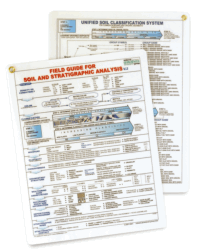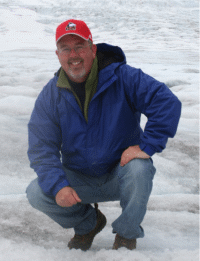
BORING LOG BASICS: PART 1:
Fundamentals of Preparing Soil Boring Logs
 Most boring logs can be improved with a few simple changes. A change in perspective about how we see the sedimentary sequence can often simplify the process while helping prepare more reliable boring logs.
Most boring logs can be improved with a few simple changes. A change in perspective about how we see the sedimentary sequence can often simplify the process while helping prepare more reliable boring logs.
Describing every detail of every sample is not the answer. When the field professional understands (1) geologic context and (2) scale of deposition, it is a priceless first step in:
TAKING THE MYSTERY OUT OF THE SUBSUFACE ®
Let's face it, we all have preferences, styles and habits when preparing boring logs. Most of our habits are sufficient, but most professionals realize that education, training and practice help the ability of staff to think on their feet while yielding boring logs that are accurate and complete...and credible.
Consequences of Poor Boring Logs
- They fail their objective: documenting the nature and distribution of subsurface units.
- Forces decisions on:
- Defining and characterizing geologic units
- Identifying ground water monitoring units
- Recognizing contaminant pathways
- Understanding the distribution of physical properties, including hydraulic conductivities.
- Call into question the ability of the field staff, and project manager.
- Reflects poorly on the project.
- Jeopardizes company reputation.
Benefits of Good Boring Logs
- Achieves the primary objective of taking the mystery out of the subsurface.
- It's money wisely spent.
- Enables others to reliably understand the subsurface.
- Create efficiencies and allows for certainty in other project tasks.
- Provides value beyond the immediate project.
- Showcases work for business development purposes.
- Allows personal pride and achievement.

Well drillers logs occasionally get criticized, but sometimes our own
geologic logs don't provide much more meaningful information.
We can easily do better.
Part One of this Two-Part Webinar Series presents the fundamental elements for preparing meaningful boring logs. We will review the basics of soil boring logs and teach a perspective that allows field staff to "read the story that the sediments are telling." We will review common problems that we face as an industry and present insights that allow for easier and more reliable soil descriptions.
Plus, this unique online experience invites site coordinators to share their own experiences in order to help all of us think better on our feet in the field.
PARTICIPANTS WILL BENEFIT BY:
- Gaining a perspective that allows simpler logging procedures.
- Reviewing boring log basics.
- Reviewing the Unified Soil Classification System, for field classification.
- Discovering common problems we face with terminology and systems.
- Learning about the power of the field form format.
YOUR INPUT IS INVITED:
SHARE YOUR EXPERIENCE, INSIGHTS AND TECHNIQUES
Following the first module (Part 1 webinar), participants are invited to share their tips and tricks for better logging procedures. You can share your favorite stories, advice, and special logging techniques using an online portal. Each site coordinator can upload of 1,000-word written summary and two images to be shared with other's joining the webinar.
This is a unique opportunity to both share your favorite field technique plus learn tips and tricks from other's experiences and advice.
Each summary and image will be assembled into a PDF and distributed to the site coordinators about 3 days before the second webinar module. You are invited to share the PDF with your site participants in preparation for the second webinar module.
The instructors will summarize the submittals and present highlights during the second live webinar module. A post-webinar follow up will invite all participants to offer feedback on all items.
REGISTER NOW for this unique online experience that presents boring log basics plus invites you to share your insights too!
 Free FIELD GUIDE FOR SOIL AND STRATIGRAPHIC ANALYSIS with each registration.
Free FIELD GUIDE FOR SOIL AND STRATIGRAPHIC ANALYSIS with each registration.
And, you may purchase additional field guides for a special discounted price of $10.00 plus shipping.
| Fee: |
249.00 USD for Part One,
Per Computer Site (unlimited participants per site), or
149.00 USD Each for Both Parts,
Per Computer Site (unlimited participants per site)
when Members also register for the following Webinar:

(discount will be applied during checkout when both are in your cart)
Pay one site registration fee and an unlimited number of participants from your organization can attend at that site.
|
| Instructor: |
Dan Kelleher, PG, CIPM |
|
| Handouts: |
Copy of Webinar Slides (pdf)
Record of Attendance Form (pdf)
|
| Duration: |
1.0 hour plus Q&A
(no restrictions on time limit for extra Q&A!)
|
Professional
Development: |
Earn 1.0 Professional Development Hours (1.0 PDH)
 |
A Record of Attendance Form is included free with each webinar for your record keeping and individual PDH verification. We ask your on-site coordinator to return the completed and signed copy of the Form to us following the webinar for (1) maintaining a separate copy as a service to attendees and (2) forwarding to NIU confirming attendance for those who order certificates.
Attendees may also order an official a Course Completion Certificate from Northern Illinois University for a small administrative fee. The Certificate is optional and may be ordered separately following the webinar to confirm your attendance and showcase the certificate on your office wall. Instructions for ordering certificates are given during the webinar.

* This webinar is eligible for the 'BUY THREE, GET THREE' discount; however ANY webinar series discount shown above cannot be combined with it.
Attendees will be invited to actively participate during this live and interactive on-line web seminar. Discussion is planned following the webinar for those who want to continue the session. Bring your questions to the webinar and present them to the instructor and other participants for exploring the best solution.
Instructors Bio
 Dan Kelleher is a hydrogeologist and project manager who strives for excellence in subsurface characterization. His technical expertise is quantitative hydrogeology (in porous and fractured media), geotechnical analysis of sedimentary sequences, aquifer testing and predictive ground water modeling.
Dan Kelleher is a hydrogeologist and project manager who strives for excellence in subsurface characterization. His technical expertise is quantitative hydrogeology (in porous and fractured media), geotechnical analysis of sedimentary sequences, aquifer testing and predictive ground water modeling.
He promotes field analysis during stratigraphic characterization from boring to boring in order to utilize QA/QC processes fully throughout a project and help identify unexpected conditions as soon as they arise.
Dan is a registered Professional Geologist (PG) and Certified International Project Manager (CIPM). He earned his undergraduate degree in Geology from Monmouth College and his Master's in Hydrogeology from Northern Illinois University. Besides contributing to several other organizations, Dan is the Solid and Hazardous Waste Subcommittee Chair for the Association of Engineering Geologists.